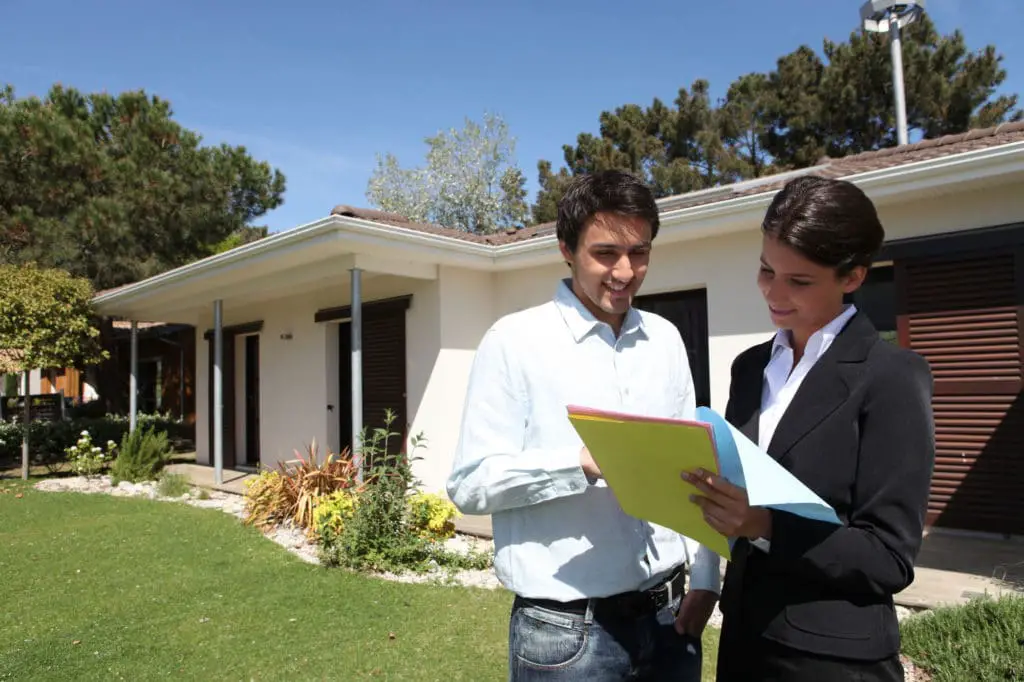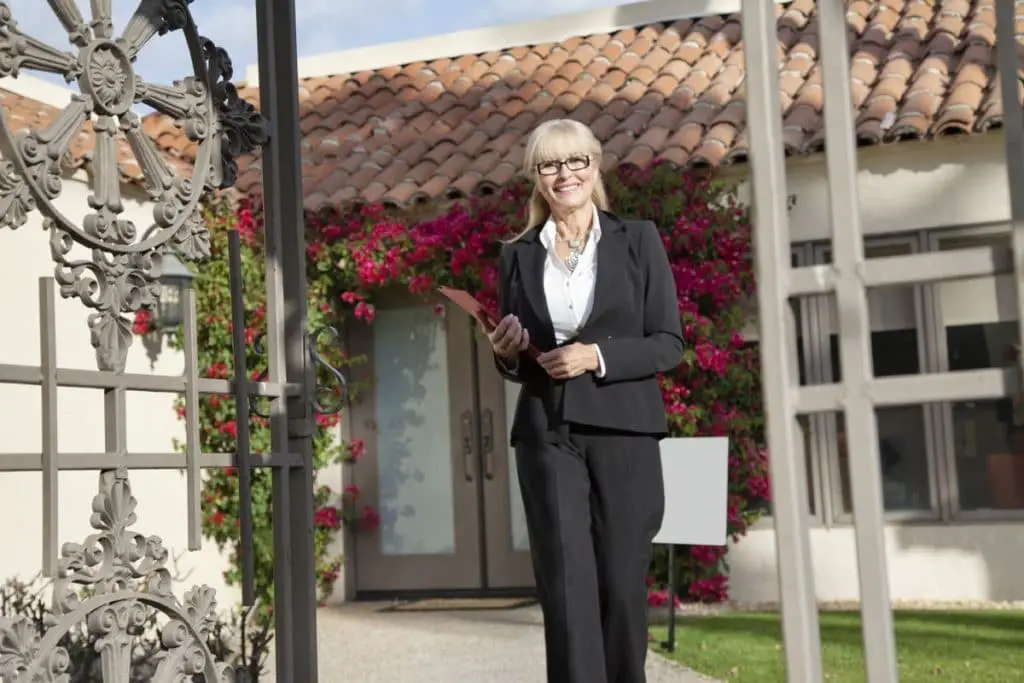(**) Disclosure: This post may contain affiliate links, meaning RealEstateCareerHQ.com will get a commission if you decide to make a purchase through the links, but at no additional cost to you.
Are you thinking of being a real estate appraiser in Massachusetts? Then you have landed in the right page.
To become a real estate appraiser in Massachusetts, you would start off in working as a Trainee Appraiser, then work your way up toward other designations such as the Licensed Residential Appraiser, Certified Residential Appraiser, and the Certified General Appraiser.
You must fulfill the qualifying appraisal education, work experience requirement and register with the Massachusetts Board of Registration of Real Estate Appraisers. This board is the regulatory agency which governs individuals and companies that appraise the value of real estate, and also appraisal management companies (AMCs), in accordance with federal guidelines.
As a real estate appraiser in Massachusetts, your job is to provide an assessment of the properties’ market value for your clients. Your appraisal report could be used by a home buyer or seller, a mortgage lender who wants to understand the value of the collateralize assets, an individual who needs it for tax assessment or even lease negotiation.
Regardless of who is in needs of your appraisal services, your work products must remain objective, unbiased and professional.

The first step to your appraisal career is to complete the pre-licensing courses from a trusted education provider. McKissock received an incredible rating from its students, and their online lessons are taught by instructors who have actual experience in the appraisal industry. You may click here to find out more about their courses. (**)
How to Become a Trainee Appraiser in Massachusetts?
To begin your journey as an appraiser, your first step is to become a Trainee Appraiser. At this stage, you will be trained and supervised by a certified appraiser. An experienced supervisor could guide you into the right direction in this career.
The supervisory appraiser should provide you with hands-on appraisal techniques, effective ways to research on a property, and how to analyze the data. Most importantly, how to determine an unbiased estimation of the property’s market value.
Your daily routine could include doing property research, working on appraisal reports, or inspecting real estate together with the supervisor.
To get out the most from this trainee stage, it is recommended you to walk through each and every step in the appraisal process, observe carefully on how your supervisor inspect and evaluate real estate, and always raise your questions.
4 Steps to Become a Trainee Appraiser in Massachusetts
Step 1: Meet the Basic Requirement:
- You must be at least 18 years old
- Have a valid Social Security Number
- No prior related experience is needed
Step 2: Complete the Pre-License Education
You need to complete the 75 hours of qualifying appraisal-related education.
I included some details which could be helpful to your studying on our education resources page. Be sure to check it out.
Step 3: Submit Application to the Board of Registration of Real Estate Appraisers
Now you have completed the education prerequisites, your next step is to register with Board. If the Appraisal Board in your state has the online submission available, then I would strongly encourage you to use that option. Not only this is the quickest and most convenient way, but less paper mailing is also good for the environment.
Step 4: Find a Certified Appraiser to be Your Supervisor

You might wonder how to find a supervisory appraiser. You could start connecting with Certified Appraisers through different industry associations, forums or even on LinkedIn. The more appraisers you network with, the higher the chance you could find a good mentor.
Once you start working alongside with a supervisor, you need to keep track of your working hours with the board-approved experience log. This document is important for the purpose of upgrading your appraiser license in the future.
Also, keep in mind that you and the supervising appraiser are required to sign on every page of the experience log.
Here’s a snippet of what a Certified General Appraiser recommends when looking for a supervisor

“Along with the PROFESSIONAL resume you send by snail mail and email, enclose a document that thoroughly describes your house (or someone else’s house). I am talking about a thorough description.
In appraisal, we start with the big picture and work our way down to the details. So start with the community you live in and tell your prospective mentor about the community…”
Timothy S. Evans, SRA, Certified General Appraiser at Monroe Valuation, Inc
Still unsure how to find a supervisor? No problem, here’s another post for you: “How to Find a Supervisory Appraiser? (Tips from CG Appraiser and Trainee).” In there, you will find full details of Timothy’s recommendation and 11 incredibly helpful ideas in finding a supervisory appraiser.
How to Become a Licensed Residential Appraiser in Massachusetts?

As a Licensed Residential Appraiser, you can evaluate non-complex residential properties with 1-4 units, while the transaction value is cannot be more than $1,000,000. Although you can also evaluate complex properties, the maximum value is up to $250,000.
When working as a fee-based appraiser, you could be writing appraisal reports for clients such as individuals, lenders, banks, or appraisal management companies (AMC). Your job duties could include doing research online, going on the field to inspect properties, and writing the appraisal reports.
On the other hand, you could also be hired by an appraiser company or financial institution as their in-house appraiser, where you could enjoy the stable income and employee’s benefits.
This license could be worth considering for those who have not fulfilled the necessary work experience or college-level education to become a certified appraiser but wish to excel their career from the Trainee Appraiser.
5 Steps to Become a Licensed Residential Appraiser in Massachusetts
Step 1: Meet the Basic Requirement
- You must be at least 18 years old
- Have a valid Social Security Number
- Hold an Associate Degree or higher. Or complete 30 semester credit hours covering specific subject topics.
Step 2: Complete the Required Hours of Working Experience
You must have at least 2000 hours of acceptable appraisal experience, where they need to be acquired for over a 24 months period.
Step 3: Fulfill the Education Requirement
You’ll need to complete 150 hours of qualifying appraisal education from an approved course provider.
You should have taken some of the courses when becoming a Trainee Appraiser, so that you are only required to fulfill the additional course works.
Step 4: Submit Application to the Board of Registration of Real Estate Appraisers
Once you have fulfilled the education and working experience requirement, you should submit the application to the the Board along with other required documents.
The Licensing Board in some states may require you to apply within a specific period after you complete the pre-licensing education. Therefore, don’t wait till it expires!
Step 5: Pass the Licensed Residential Appraiser Exam
Now it’s the time to write the exam! The purpose is to test your appraisal knowledge, especially the subjects that are covered in the pre-licensing courses.
Doing multiple sets of practice questions is an excellent way to prepare for the exam and also boost your confidence.
To increase your chance in passing the exam on the first time, make sure to check out our exam hacks. In there, not only you will find the content of the exam, but also 10 effective tips on how to prepare for it.
How to Become a Certified Residential Appraiser in Massachusetts?

As a Certified Residential Appraiser, you can assess for:
- residential properties with 1 to 4 residential units regardless of the transaction value or complexity.
- non-residential 1-4 units property given that the transaction value is no more than $250,000
Just like a Licensed Residential Appraiser, you could a self-employed appraiser running your own practice, servicing clients such as individuals, lenders, banks, or appraisal management companies (AMC).
Alternatively, you could work for an appraiser firm or financial institution to become their in-house appraiser, where you could enjoy the stable income and company’s benefits.
However, there is no restriction on the transaction value of residential properties you could assess. The scope of your practice and business opportunity would be a lot wider than being a Licensed Residential Appraiser. In fact, many reputable lenders and financial institutions in Massachusetts only accept assessment work from Certified Appraiser.
So what is like to be a residential appraiser in Massachusetts? We looked into some job postings and found one that might give you a better insight.
This job posting was from a bank in Boston. They were looking for an appraiser to perform and review property appraisals. Many properties involved would be the complex incoming-producing type.
Part of your duties would be:
- Communicate and order appraisals from other independent appraisers.
- Advise bank personnel about the property values, rent-ability, marketability, and the real estate market.
- Inspect properties on-site including those that are under construction
- Ensure the appraisal reports complied with the regulatory standard.
This position required at least two years experience in the real estate appraisal industry. It’s a full-time position with 40 working hours per week
That being said, let’s review the steps for you to become a Certified Residential Appraiser.
5 Steps to Become a Certified Residential Appraiser in Massachusetts
Step 1: Meet the Basic Requirement
- You must be at least 18 years old
- Have a valid Social Security Number
- Hold a Bachelor’s degree or higher
You need to complete a minimum of 2500 hours of acceptable appraisal experience in not less than a 24 months period.
Step 3: Fulfill the Education Requirement
You’ll need to complete 200 hours of qualifying appraisal education from an approved course provider.
Since you should have taken some of the courses when becoming a Trainee or Licensed Residential Appraiser, you are only required to complete the extra classes.
Step 4: Submit Application to the Board of Registration of Real Estate Appraisers
Once you have fulfilled the education and working experience requirement, it’s time to submit the license application.
Most State Boards allow you to apply through their website. Some would even charge a lower registration fee by doing online. You should definitely check out this option.
Step 5: Pass the Certified Residential Appraiser Exam
Cramming for the exam is ineffective. Instead, you should study for 45 to 60 minutes, then take a break. Concentration tends to wander if you study for too long. If possible, focus on studying only one to two topics per day. But be really good at it.
Here’s a Snippet of What Jamie Owen Thinks About Being a Real Estate Appraiser!

“The more you learn, the more you will enjoy being an appraiser.”
“I think that humility and honesty are the most important attributes. Humility is important because if we think we know it all, we are going to be in trouble. Being appraiser requires not being thin-skinned and defensive. Others have their opinions and we have ours. Both may be supportable in one way or another.
Being humble helps us to respect the views of others and not be offended if others have a different view. Humility also helps with business relationships, as well as accepting guidance and reminders when we need them, from peers and others.”
– Jamie Owen, Certified Residential Real Estate Appraiser at Aspen Appraisal Services
Here’s an exclusive interview with Jamie. He shared with us his journey and valuable experience in the appraisal industry. You’ll also learn what it is like to be a real estate appraiser nowadays.
How to Become a Certified General Appraiser in Massachusetts?

So you want to explore appraising for commercial real estate? Then becoming a Certified General Appraiser would be the way to go!
This designation is the highest credential you could get in the appraisal industry. You could assess all types of real estate regardless of the transaction value or complexity. There is no limitation on the scope of your appraisal work.
Although you still could evaluate for residential properties, you could also be appraise a portfolio of commercial real estates for institutional investors.
Since your clients depend on your appraisal reports in making an informed investment decision, you must be extremely careful and responsible when handling your work. Extensive research and site inspections are often required. It is your responsibility to provide your clients with an objective appraised value as accurate as possible.
Due to the requirement of low margin of error in your work products, the amount of work experience and education required to become a Certified General Appraiser is the most challenging among all the levels of licensing.
So what kind of jobs are available in the commercial real estate appraisal field in Massachusetts? Here’s an interesting job posting we just saw.
It was from a government department where they were looking to hire a Review Appraiser. To our understanding, the department involved in constructing roads and bridges. Their land-taking activities which could potentially impact businesses and homeowners.
As their Review Appraiser, part of your job would be to negotiate with landowners of a fair compensation plan and provide assistance during the relocation process.
In order to do so, you would need to:
- Review and conduct appraisals which complied with the Uniform Standards of Professional Appraisal Practice (USPAP).
- Attend meetings with property owners, government agency personnel and other related parties
In some instances, you would also need to assist the Office of the Attorney General to resolve or prepare cases in court.
This position required at least five years experience in the real estate industry. Must hold the Certified General Appraiser license.
This is a full-time position with a starting salary of approximately $63,000.
But first you would need to become a Certified General Appraiser, so let’s go through the steps to get you this credential.
5 Steps to Become a Certified General Appraiser in Massachusetts
Step 1: Meet the Basic Requirement
- You must be at least 18 years old
- Have a valid Social Security Number
- Bachelor’s Degree in any field of study; or higher
Step 2: Complete the Required Hours of Working Experience
You must have at least 3000 hours of acceptable appraisal experience where they need to be obtained for over a 30 months period. At least 1500 hours of working experience needs to be from non-residential appraisal work.
Step 3: Fulfill the Education Requirement
You’ll need to complete 300 hours of qualifying appraisal education from an approved course provider.
You should have completed some of the courses when the previous license(s). Therefore, you are only required to complete the extra classes.
Step 4: Submit Application to the Board of Registration of Real Estate Appraisers
Once you have completed all the education and working experience prerequisites, you should fill out the license application.
Later in this post, I’ll go over the documents and fees needed for the registration process.
Step 5: Pass the Certified General Appraiser Exam
The final step is to pass the Certified General Appraiser Exam. Get enough sleep the night before the exam and have a good meal before it. Managing your stress level during the test is another key to passing it.
Which Appraisal Courses are Required for Each License?
| Trainee Appraiser (Credit Hours) | Licensed Residential Appraiser (Credit Hours) | Certified Residential Appraiser (Credit Hours) | Certified General Appraiser (Credit Hours) |
|
|---|---|---|---|---|
| National USPAP Course or Equivalent | 15 | 15 | 15 | 15 |
| Basic Appraisal Principles | 30 | 30 | 30 | 30 |
| Basic Appraisal Procedures | 30 | 30 | 30 | 30 |
| Residential Market Analysis and Highest & Best Use | 15 | 15 | ||
| Residential Appraisal Site Valuation and Cost Approach | 15 | 15 | ||
| Residential Sales Comparison and Income Approaches | 30 | 30 | ||
| Residential Report Writing and Case Studies | 15 | 15 | ||
| Statistics, Modeling and Finance | 15 | 15 | ||
| Advanced Residential Applications and Case Studies | 15 | |||
| Appraisal Subject Matter Electives | 20 | 30 | ||
| General Appraiser Market Analysis and Highest & Best Use | 30 | |||
| General Appraiser Site Valuation and Cost Approach | 30 | |||
| General Appraiser Sales Comparison Approach | 30 | |||
| General Appraiser Report Writing and Case Studies | 30 | |||
| General Appraiser Income Approach | 60 | |||
| Total | 75 hours | 150 hours | 200 hours | 300 hours |
The Massachusetts Board does not recognize Qualifying Education that are taken on-line.
Interested in becoming a real estate appraiser? Here is an Education Resources Page which could be helpful to you in getting the appraiser license.
How to register with the MA Board of Registration of Real Estate Appraisers?

Once you have fulfilled all the prerequisites, you could submit your application to the Board of Registration of Real Estate Appraisers.
They have a nicely designed website, so you basically can do all the submission work online. Here’s the link to their e-portal.
In additional to the application, you must provide the following:
- Registration fee
- Supporting legal documents
- Evidence which shows you have completed the required hours of Board-approved appraisal courses. (i.e., Official transcripts, course completion certificates).
- Proof that you have fulfilled the specific requirement of post-secondary education for your license (i.e.: Diploma, official transcripts, certificates.)
- Stated Approved Appraiser Experience Log (Only if you are applying to become Licensed/Certified Appraiser)
- One professional photo
- Criminal Offender Record Acknowledgment Information Form (CORI)
If you have any questions, you could contact the State Board at (617) 727-3055, or dpl-appraiser-board@mass.gov.
Check out these Details about the MA Appraiser Exam

Once the State Board accepts your application, they will send you a notice with instruction to schedule the exam. PSI will administer the exam, where you can take it on a computer at their examination center.
- Licensed Residential Appraiser Exam is a 4 hours exam,
- Certified Residential Appraiser Exam is a 4 hours exam;
- Certified General Appraiser Exam is a 6 hours exam
The licensed and certified exams consist of 125 questions. Only 110 questions will be scored, the other 15 are pretest questions. The required passing score is 75. You will immediately know your score once you finish writing the test.
The exam fee is $75. You could find out more details in the Appraiser Licensing Examination Candidate Information Bulletin.
FAQ on Massachusetts Real Estate Appraiser Career

How long does it take to become a real estate appraiser in Massachusetts?
It takes 24 to 30 months to become a real estate appraiser in Massachusetts. That is the minimum period to complete the work experience so the duration would hugely depend on which appraiser license you are pursuing, the time it takes you to complete the work experience, pre-licensing courses and pass the appraiser exam.
It takes 2,000 hours of work experience to become a Licensed Residential Appraiser in Massachusetts, 2,500 hours to become a Certified Residential Appraiser and 3,000 hours to become a Certified General Appraiser.
How to renew a real estate appraiser license in Massachusetts?
All real estate appraisers in Massachusetts are required to renew their license every two year.
In addition to the renewal application, below are the requirements to renew your appraiser license:
- Finish 28 hours continuing education every 24 months, of which must include 7 hours of National USPAP Update course.
- For Certified Residential licensees, no more than 7 hours of elective courses
- For Certified General licensees, at least 14 course hours must be designated as non-residential.
- Pay the renewal fee
Also, a Trainee Appraiser cannot renew their license more than 4 times after the original issue date.
You could renewal the license through their e-portal.
To prevent interruption to your appraisal practice, you should renew it and complete all continuing education requirement before the license expiry date.
How much do real estate appraisers make in Massachusetts?
Your earning ability as a real estate appraiser is subjected to many variables such as your experience, licensing level, the type of properties you specialize in appraising, the company size, its location, and most importantly, the amount of effort you are willing to put into this career. Therefore, the income differential among real estate appraisers in Massachusetts could be large.
According to the Bureau of Labor Statistics (May 2021), real estate appraisers in Massachusetts make an average yearly income of $78,870. The income range typically ranges between $60,680 to $100,380. Top earning property appraisers in Massachusetts make over $126,330.
Here’s a complete income guide on real estate appraisers in Massachusetts. In there, I will uncover the income updates, the percentage of appraisers that are making a good living, and whether being a commercial or residential appraisers has any effect on the income. So be sure to check it out!
Can real estate appraisers earn six-figures income annually? Here’s an article that talks about the different factors that could affect an appraiser’s earning.
How Many Real Estate Appraisers are in Massachusetts?

According to the Appraisal Subcommittee, there are 1927 real estate appraiser in Massachsetts. The breakdown is as follow:
- 672 Certified General Appraiser
- 1062 Certified Residential Appraiser
- 193 Licensed Residential Appraiser
Massachusetts has over 6.8 million people. It is a densely populated state, and the two major metropolitan areas are Greater Boston and Springfield.
When you are deciding the regions to conduct your appraisal practice, you should target areas that have a high population. After all, businesses can only occur when there are customers.
Is real estate appraiser a good career? This is one of the common questions I hear a lot. Therefore, I spent months and months in connecting with different real estate appraisers. Here are their valuable insights about this profession. Make sure to check it out!
Career Tips for Aspiring Appraisers in Massachusetts
Tip#1: Take the appraisal courses
You could read as much about the appraisal career as you want, but your journey would not begin unless you start taking action.
Taking the real estate appraiser classes would be your first step. Not only you could gain valuable knowledge and practical skills, but you will also have a better understanding about what is like to be an appraiser.
Besides, most states would require you to complete all the trainee education before your working experience could count toward the licensing requirement.
Tip#1: Network with other real estate professionals in Massachusetts
Networking with other appraisers in Massachusetts is a good way to gain a better understanding about the appraisal industry. You could do so by joining industry affiliations, online forums or even LinkedIn groups. For instance,
- The Association for Valuation Professionals (MBREA)
- AppraisersForum.com
- Massachusetts & Rhode Island Chapter of the Appraisal Institute
Begin with a friendly conversation. Let them know that you are starting your career as an appraiser, ask them if they have any tips or advice for newbies to the industry.
In addition, you should network with other professionals in the real estate field. Mortgage agents, lenders, and realtors can all provide you with valuable insight, which could be very helpful to your career building in the long haul.
Here’s a list of real estate professional groups on our resource page. Remember to check it out!
Tips#2: Consider the commercial real estate route
Just like many other states, the business to appraise for residential properties could be quite competitive. Well, as you could imagine, there is a considerable overlap of targeted customers for the first three levels of licensing.
To differentiate your skills and broaden your scope of practice, you could consider pursuing the Commercial General Appraiser designation as your long-term goal.
If you are reading up to this point, I bet you must be interested in the real estate appraiser profession. Your first step is to complete the pre-licensing courses. You should select one that has an excellent reputation and long-term track record of satisfying students. McKissock is exactly that! You may click here to check it out yourself. (**)
(**) Affiliate Disclosure: Please note that some of the links above are affiliate links, and at no additional cost to you. Our company, JCHQ Publishing will earn a commission if you decide to make a purchase after clicking on the link. Please understand that we include them based on our experience or the research on these companies or products, and we recommend them because they are helpful and useful, not because of the small commissions we make if you decide to buy something through the links. Please do not spend any money on these products unless you feel you need them or that they will help you achieve your goals.
Disclaimer: The information in this post is for general information only, and not intend to provide any advice. They are subjected to change any notice, and not guaranteed to be error-free. For full and exact details, please contact The Massachusetts Board of Registration of Real Estate Appraisers
Reference:
- Mckissock Learning- Massachusetts Appraisal License Requirements: (Source)
- Mckissock Learning- Learn Appraisal Educational Requirements for Massachusetts: (Source)
- The Appraisal Foundation- National Uniform Licensing and Certification Examinations: (Source)
- Appraisal Subcommittee- Active Appraiser Credentials Summary Report (Source)
- sokanu – How much does a Real Estate Appraiser make in Massachusetts? (Source)
- salary.com- Salary for Appraiser (Commercial Real Estate) in Massachusetts: (Source)
- salary.com- Salary for Appraiser (Residential Real Estate) in Massachusetts: (Source)
- The Massachusetts Board of Registration of Real Estate Appraisers (Source)

